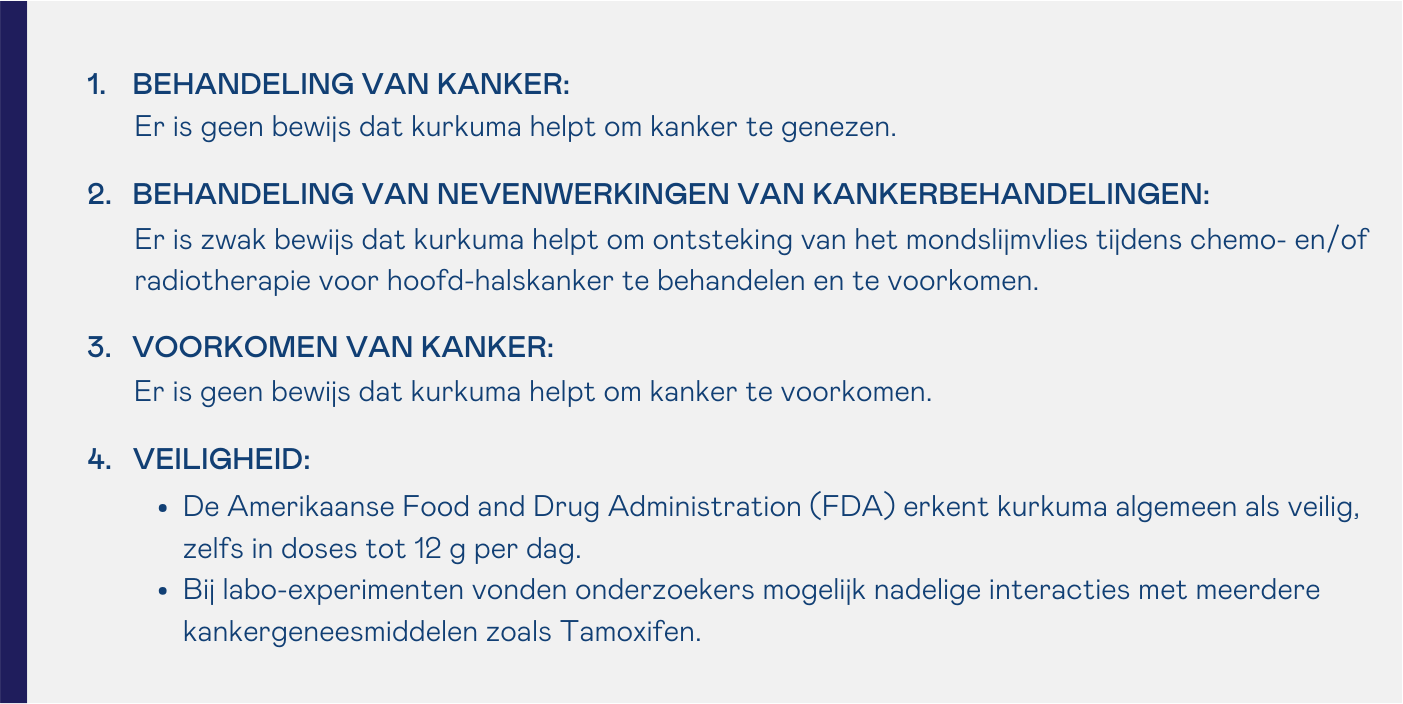Menu


Kurkuma is een gele specerij, gewonnen uit de wortelstok van de plant Curcuma longa. Het wordt gebruikt in kerriepoeder en currygerechten en komt hoofdzakelijk uit India. De gele kleurstof uit kurkuma is ook bekend onder het nummer E-100, dat soms wordt toegevoegd aan margarines en gelei.
Kurkuma is rijk aan polyfenolen. Die hebben een anti-oxidatieve werking en worden als voedingssupplement verkocht (1-3).
Niet-conventionele therapeuten gebruiken kurkuma al eeuwen als middel om ontstekingen, huidziekten, maagproblemen, hart- en leverziekten, prikkelbare darm, hoge bloeddruk en gewrichtsklachten te behandelen (6-8).
Over de toepassing van kurkuma bij kanker(behandelingen) verschenen vele studies. Een twintigtal maken de vergelijking tussen kurkuma en placebo’s (nepmedicatie), meestal voor ondersteunende zorg en het voorkomen van kanker. De meeste onderzoeken zijn klein van omvang en er zijn grote verschillen tussen studies. Er zijn verschillen in:
Bovendien zijn de resultaten vaak niet eenduidig.
Er zijn aanwijzingen dat kurkuma de ontwikkeling van sommige kankers zou kunnen vertragen door de effecten van bestralingen en chemotherapie te versterken (17-21). Er zijn echter weinig studies die het effect van kurkuma bij de behandeling van kankers nagingen, zoals het effect op overleving, tumorgrootte of biomerkers. Er is op dit moment onvoldoende bewijs om aan te geven dat kurkuma kanker zou genezen (22-26). Deze studies werden uitgevoerd bij patiënten met prostaatkanker (22), colorectale kanker (23, 24, 26) of chronische leukemie (25). Ze waren vaak klein van omvang en hadden een korte opvolgtijd. Dat beperkt de wetenschappelijke waarde.
Kurkuma zou volgens enkele beperkte studies een verzachtend effect kunnen hebben op nevenwerkingen van kankerbehandelingen als gevolg van bestralingen of chemotherapie.
Enkele studies vinden een mogelijke beschermende werking van kurkuma bij kanker. De meeste van die studies zijn echter van lage kwaliteit en hadden een beperkt aantal deelnemers (36).
De Amerikaanse Food and Drug Administration (FDA) erkent kurkuma
algemeen als veilig, zelfs in doses tot 12
g per dag gedurende meerdere maanden (8).
Dat neemt niet weg dat er nevenwerkingen kunnen optreden,
zoals:
Volg daarom steeds goed de aanwijzingen op de verpakking.
Ben je zwanger of geef je borstvoeding? Het is onvoldoende bekend of kurkumasupplementen dan veilig zijn (8, 48).
In de wetenschappelijke literatuur zijn er veel mogelijke interacties beschreven tussen geneesmiddelen en kurkuma (4, 49, 50).
Kurkuma heeft theoretisch (labo- en dierproeven) een licht antistollingseffect op het bloed. Daardoor kan het mogelijk de werking van antistollingsmedicatie (‘bloedverdunners’) versterken (1, 56) (55). Of het ook zo werkt in de praktijk, is niet bewezen. Daarom is het aangewezen om voorzichtig te zijn en een arts te raadplegen.
Professionele medewerkers beantwoorden je vragen